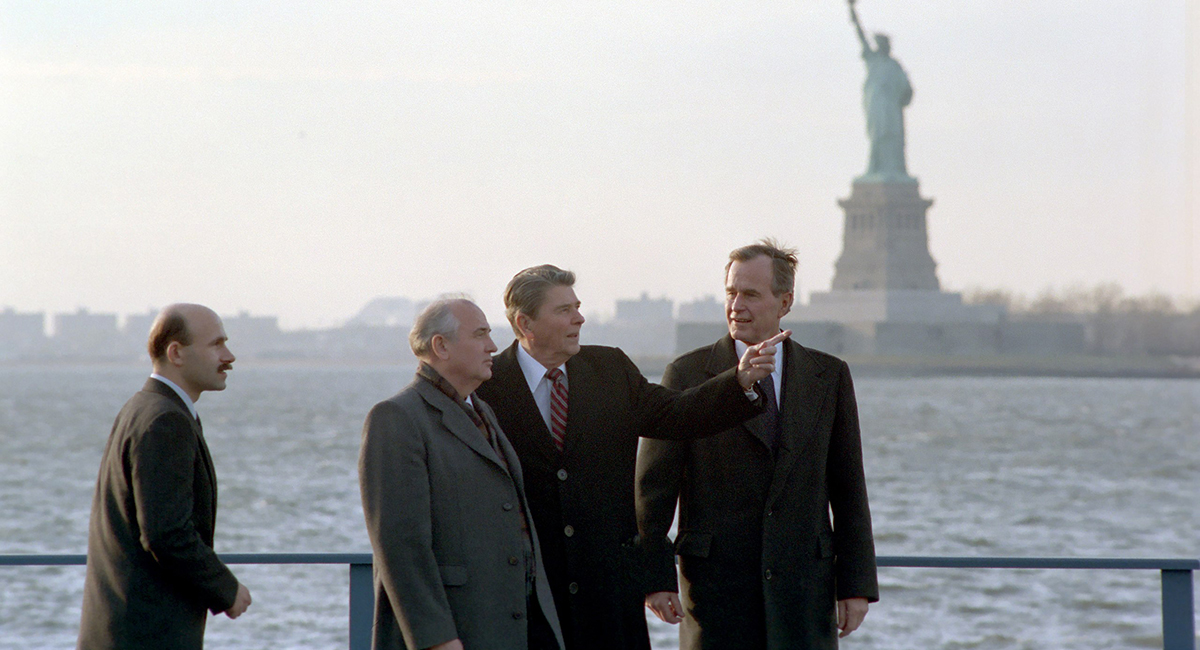风萧萧_Frank
以文会友美国能重蹈苏联覆辙吗?
https://www.independent.org/news/article.asp?id=14271
2022年9月7日 JUDY L. SHELTON 朱迪·谢尔顿 - 独立研究所的高级研究员、国家民主基金会前主席、欧洲复兴开发银行前美国董事。
昆尼皮亚克大学进行的一项令人不安的新民意调查发现,67% 的美国人担心美国的民主面临崩溃的危险。这可能吗? 这对美国的未来意味着什么? 现在进行重大路线修正是否为时已晚?
该民意调查结果于周三公布,即苏联最后一位领导人米哈伊尔·戈尔巴乔夫去世后的第二天。 对于戈尔巴乔夫来说,似乎不可能想象苏维埃社会主义共和国联盟——共产主义堡垒、军事超级大国——会崩溃。
但它确实做到了。 这个横跨大陆的国家于1922年12月在弗拉基米尔·列宁的领导下通过条约成立,并于1991年12月正式解散。然而,当戈尔巴乔夫于1985年3月上台担任总书记时,他的目标不是使国家解体,而是加强国家实力。并巩固它。
戈尔巴乔夫主要从经济角度看待主要挑战:社会主义学说认为经济力量可以完美协调以实现效率最大化,但腐败和金融管理不善导致了经济停滞和工人不满。
戈尔巴乔夫提出的补救措施是提高国内经济重组(perestroika)必要性的透明度(glasnost),同时寻求国外投资资本来为转型提供资金。
作为全球政治舞台上冉冉升起的新星,戈尔巴乔夫成功地与玛格丽特·撒切尔等精明的领导人建立了友谊。撒切尔在 1979 年至 1990 年间担任英国首相,并曾宣布西方和新的苏联领导人“可以一起做生意”。 ”
敌对行动的缓和为苏联通过无数新选择借款打开了大门。 除了从西方商业银行获得贷款并允许外国人通过合资企业将资本引入苏联外,戈尔巴乔夫还与英国和瑞士就未偿沙皇债务达成和解,并于1988年1月在国际资本市场上发行了苏联首次公开债券。
然而,在戈尔巴乔夫的个人魅力和与西方国家加强合作关系的呼吁之下,却隐藏着日益增长的焦虑感。开放和改革越暴露出中央计划模式核心的腐败,就越需要确保为进口消费品和技术提供资金,以满足苏联日益不安的公民并增强其日益昂贵的军事能力。
我自己作为斯坦福大学胡佛研究所博士后奖学金的获得者,开始参与这些历史发展。 由于担心缺乏有关苏联债务的全面统计数据,我于1984年11月提交了一份建议,分析西方资本对苏联经济的影响。
初步研究表明,公布的西方政府和商业银行贷款数据明显低估了风险敞口水平; 此外,我怀疑苏联的内部财政和货币状况远比其政府声称的要糟糕。
不过,这个故事最终将远远超出简单地指责一个可能无力偿还债务的主要借款国的情况。我的学术分析被转化为一本公共政策书籍,题为《即将到来的苏联崩溃:戈尔巴乔夫在西方金融市场对信贷的绝望追求》。
这将导致苏联即将破产这一看似难以置信的断言。如果我们的冷战对手在经济上不再可行,这对西方意味着什么? 如果苏联被剥夺了西方资本,它还能作为一个政治实体、一个军事超级大国继续存在吗?
最初的国际银行问题变成了国家安全的关键问题,对西方国防联盟具有战略影响。 我以前对苏联账本的绿眼审查将演变成五角大楼赞助的兵棋推演,学术理论化让位于对难以想象的场景的清醒思考。
所有这些并不意味着美国正在走一条经济衰退和政治不满并行的道路。 尽管如此,随着政府支出继续超过收入,我们国家的财政状况稳步下降,仍然令人不安。
“对苏联持续的全球权威及其作为社会主义运作模式的地位的最大威胁是它所承受的巨额预算赤字,”我在 1989年的书中肯定道。“多年来,克里姆林宫不得不通过印钞来弥补长期的收入短缺。无论该体系的意识形态原则如何,这都会导致通货膨胀。”
戈尔巴乔夫统治下的苏联即将面临的财政和货币崩溃,加上其日益恶化的道德破产:在一党社会主义下建立工人天堂的愿景未能兑现其承诺。
当公民对定义他们国家的基本前提和原则失去信心并证明他们对国家的忠诚是正当的时,这必须被视为对其领导人的一个真诚的警告信号。
美国主张民主资本主义。我们需要重申对健全财政和健全货币的承诺,作为致力于个人自由、自由市场成果、机会和繁荣的自治国家的适当基础。
Could America Go the Way of the Soviet Union?
https://www.independent.org/news/article.asp?id=14271
Sept 7, 2022 By JUDY L. SHELTON

A disturbing new poll conducted by Quinnipiac University finds that 67 percent of Americans are concerned that democracy in the United States is in danger of collapse. Can this be possible? What does it mean for the future of the United States? Is it too late to bring about a major course correction?
The poll’s findings were published on Wednesday—one day after the death of Mikhail Gorbachev, the last leader of the Soviet Union. For Gorbachev, it must have seemed just as impossible to conceive that the Union of Soviet Socialist Republics—a bastion of communism, a military superpower—would ever collapse.
And yet it did. The continent-spanning nation that was formed by treaty in December 1922 under Vladimir Lenin was officially dissolved in December 1991. Yet when Gorbachev came into power as General Secretary in March 1985, his goal was not to cause the country to disintegrate but rather to strengthen and solidify it.
Gorbachev saw the chief challenge mostly in economic terms: Socialist doctrine assumes that economic forces can be perfectly coordinated to maximize efficiency, but corruption and financial mismanagement had brought about stagnation and worker discontent.
Gorbachev’s proposed remedy was to permit more transparency (glasnost) about the need for economic restructuring (perestroika) at home—while also pursuing investment capital from abroad to fund the transformation.
A rising star on the global political stage, Gorbachev was successful in cultivating friendships with such canny leaders as Margaret Thatcher, who was Britain’s prime minister between 1979 and 1990 and who famously announced that the West and the new Soviet leader “can do business together.”
This thaw in hostilities opened the door for Soviet borrowing through a myriad of new options. In addition to obtaining loans from Western commercial banks and permitting foreigners to channel capital into the Soviet Union through joint ventures, Gorbachev settled with Britain and Switzerland on outstanding tsarist debts and floated the Soviet Union’s first public bond offering on international capital markets in January 1988.
Yet beneath Gorbachev’s personal charm and appeal for more cooperative relations with Western nations was a growing sense of anxiety. The more glasnost and perestroika exposed the rottenness at the core of the central planning model, the more critical it became to secure funding for imported consumer goods and technology to satisfy the Soviet Union’s increasingly restless citizens and augment its increasingly expensive military capabilities.
My own involvement with these historical developments begins to coincide at this point—as the recipient of a postdoctoral fellowship at the Hoover Institution at Stanford University. Concerned about the lack of comprehensive statistics on Soviet indebtedness, I had submitted a proposal in November 1984 to analyze the impact of Western capital on the Soviet economy.
Initial research indicated that published data on loans from Western governments and commercial banks significantly understated the level of exposure; moreover, I suspected that the internal fiscal and monetary condition of the Soviet Union was far worse than its government claimed.
The story, though, would end up going considerably beyond simply pointing fingers at a major borrowing nation that would likely prove incapable of paying back its debts. My scholarly analysis was transformed into a public policy book entitled “The Coming Soviet Crash: Gorbachev’s Desperate Pursuit of Credit in Western Financial Markets.”
It would make the seemingly implausible assertion that the Soviet Union was going bankrupt. And if our Cold War nemesis were no longer economically viable, what would that mean for the West? Could the Soviet Union continue to exist as a political entity, as a military superpower, were it deprived of Western capital?
What had started as an international banking concern turned into a critical matter of national security with strategic implications for the Western defense alliance. My former green-eyeshade scrutiny of Soviet ledgers would evolve into Pentagon-sponsored wargaming exercises, and academic theorizing gave way to sober contemplation of unimaginable scenarios.
All of which is not to suggest that the United States is treading a parallel path of economic dissipation and political discontent. Still, it is disturbing to witness the steady decline of our nation’s fiscal condition as government expenditures continue to exceed revenues.
“The biggest threat to the continued global authority of the Soviet Union and its status as a working model of socialism is the massive budget deficit it is carrying,” my 1989 book affirms. “For years, the Kremlin has had to resort to printing money to paper over chronic revenue shortfalls. That is a recipe for inflation, no matter what the ideological tenets of the system.”
The Soviet Union’s pending fiscal and monetary breakdown under Gorbachev’s reign was compounded by its worsening moral bankruptcy: The founding vision of a workers’ paradise under one-party socialism had failed to deliver on its promises.
When citizens lose faith in the basic premise and principles that define their nation—and justify their allegiance to it—it must be taken as an earnest warning sign for its leaders.
The United States stands for democratic capitalism. We need to renew our commitment to sound finances and sound money as the appropriate foundation for a self-ruling nation devoted to personal liberty, free-market outcomes, opportunity, and prosperity.
 JUDY L. SHELTON is a Senior Fellow at the Independent Institute, former Chairman of the National Endowment for Democracy, and former U.S. Director of the European Bank for Reconstruction and Development.
JUDY L. SHELTON is a Senior Fellow at the Independent Institute, former Chairman of the National Endowment for Democracy, and former U.S. Director of the European Bank for Reconstruction and Development.




